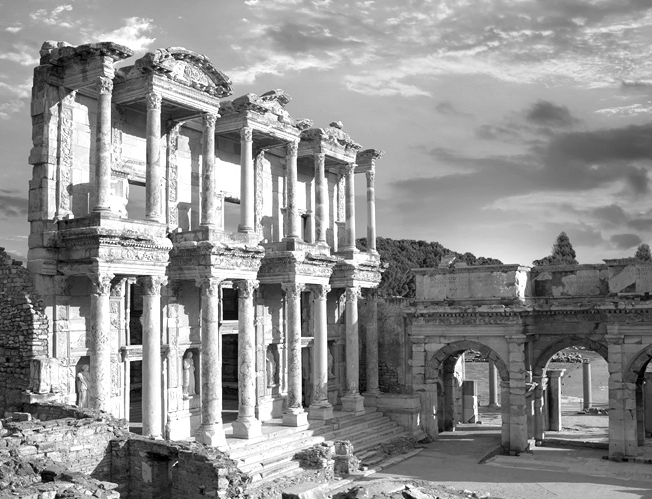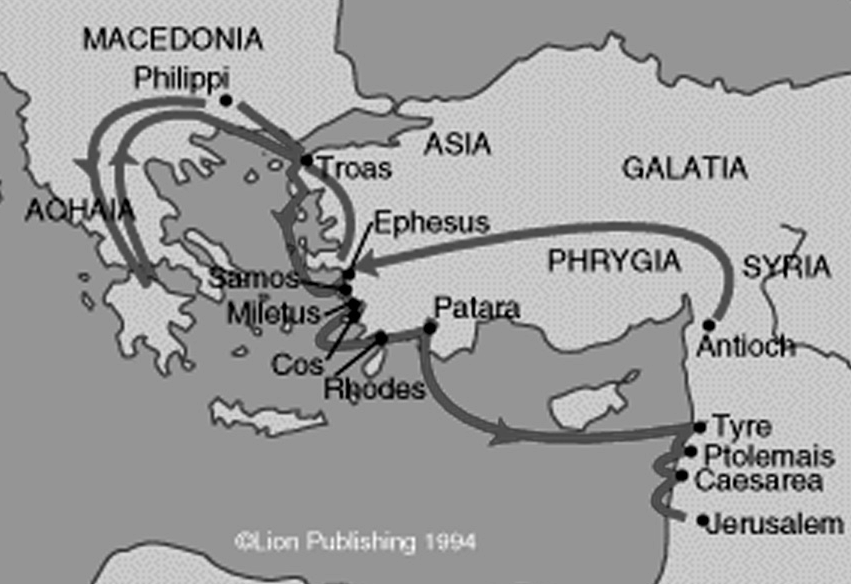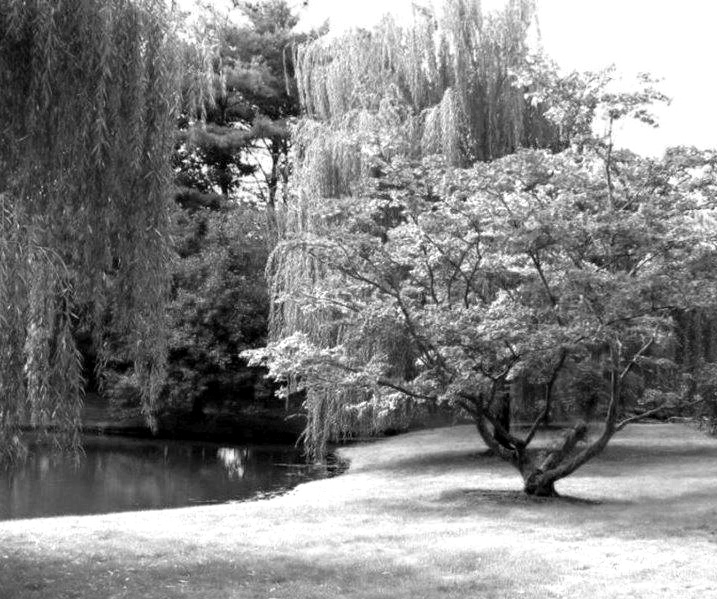Forsaken Love, The Letter to Ephesus
“Thou canst not bear them which are evil: and thou hast tried them which say they are apostles, and are not, and hast found them liars” (Revelation 2:2).
Christianity probably came first to Ephesus with Aquila and Priscilla when Paul made a brief stop there on his second missionary journey (Acts 18:18,19). On his third journey he stayed in the city for about three years and the gospel spread throughout all of Asia Minor (Acts 19:10). The city was a commercial, political, and religious center, the great temple of Diana (Artemis) being there. As a major trading center, it ranked with Alexandria and Antioch. Under Caesar Augustus, Ephesus became the capital of the Roman province called “Asia” which today is the western portion of Turkey. (Pergamum had been the capital earlier.) It was the residence of the apostle John before and after his exile on Patmos.

The Ruins of Ephesus
Jesus’ message to Ephesus is in Revelation 2:1-7. The seven stars are the “angels,” or “messengers” to the seven churches (Revelation 1:20) while the seven candlesticks are the seven churches. The object of this letter seems to be to turn the attention of the church in Ephesus to some attribute of the Savior that deserved their special regard, a special reason for attending what he said. Jesus held the seven stars, symbolic of the seven messengers of the churches, in his right hand, and he walked in the midst of the lampstands, representing the churches themselves. They depended upon him, he had the power to continue or remove their ministry, and it was by his presence only that these candlesticks would continue to give light. He would impress these truths upon them in order that they might feel how easy it would be for him to punish any disobedience, so that they might do what was necessary to assure his continued presence among them.
DISTINGUISHED LABOR
The punishment threatened (verse 5) is that he would remove the candlestick representing their church out of its place. In Revelation 1:13, Jesus stands in the midst of the golden lampstands, so as to be encircled by them. Thus he walked in the midst of them, implying constant and vigilant supervision. He went from one to another, inspecting and surveying what was under his care. He went among them as a friend to bless them, showing his love and care for them (F401, 2, Leviticus 24:2-4).
Revelation 2:2 show that Christ Jesus has a detailed knowledge of all the services of his people. First, there was distinguished labor, “I know thy works, and thy labor.” The church at Ephesus was a working church. It operated on the surrounding regions of depravity, darkness, and death. In its early life it was an active church. They were faithful in their service to the Savior’s cause, and especially in opposing error.
DISTINGUISHED PATIENCE
Second, the distinguished patience of Ephesus is referred to twice. This patience (hupomonee G5281) is an endurance of wrong with contentment, without rebellion of will, with full acquiescence in the Divine Wisdom and Love. They patiently bore opposition to the truth, they manifested firm and meek endurance in fiery trials through the many attempts by their opposers to them to draw away from simple faith in Christ. This meekness of love was known to Christ who is mindful not only of the outward manifestations of spiritual life in many labors and many offerings, but also of the hidden graces of the heart.
Jesus saw the wounded and suffering, and said, “I know thy patience.” We are prone to attach high value exclusively to the conspicuous and the declarative members of the church. While these are necessary to defend great principles, there is also a crown for holy, much-enduring silent patience. It is often easier to fight than to be patient. Patience is undervalued by an excited world; but Jesus notes it in its long vigils, and whispers his word of commendation.
DISTINGUISHED ZEAL
Third, there was distinguished zeal to support doing right. The church at Ephesus had no sympathy with the doctrines or practices of “them which say they are apostles, and are not,” nor with those mentioned in verse 6 as the “Nicolaitanes.”
Ephesus sought to have a pure ministry, a ministry whose beliefs and practices were well-founded. They carefully watched and examined the claims of pretenders, and refused to recognize those whose manner of life did not show the work of the Lord Jesus. It is morally impossible that faithful Christians and anti-Christians can have any sympathetic fellowship. In 2 Corinthians 6:14- 17 Paul said, “What fellowship hath righteousness with unrighteousness? And what communion hath light with darkness? And what concord hath Christ with Belial or what part hath he that he that believes with an infidel?”
There is, indeed, large scope for the exercise of Christian charity, and it is sometimes difficult to determine where the streams of love should pause. We should not presumptuously ascend the judgment seat, but it is needful to have a clear line that separates the sympathy of compassion from the sympathy of complacency.
DISTINGUISHED PERSISTENCE
Fourth, there was distinguished persistence in the right course. The Ephesian saints bore up under trials; they borne with the evils that assailed them. They had not given way to murmuring or complaints. They had not abandoned the principles of truth and yielded to the prevalence of error. They had shown that they could bear up under these things with patience — constant, cheerful endurance.
This is a repetition of what is said in verse 2, but in a different connection. There it speaks to the trouble that they had experienced because of the pretensions of false apostles, and the patient persevering and enduring spirit they had displayed. Here the expression is more general, denoting a patient spirit in regard to all forms of trial. The “labor” (G2873) was on account of Jesus and they had not become exhausted or wearied so as to give up.

Not a laborer in the vineyard goes unappreciated.
The Ephesians were right. They blended persistence with patience; and were extolled by him who knew the hardest toil, and exemplified the most unmurmuring endurance. “For the eyes of the LORD run to and fro throughout the whole earth, to show himself strong in the behalf of them whose heart is perfect toward him” (2 Chronicles 2:9, 1 Corinthians 8:16). Not a service rendered in the Lord’s name escapes his notice. There is not a toiler in the vineyard on whose bent form the Master does not look upon with approval.
“NEVERTHELESS”
Such is the opening of the letter. It is full with commendation. We would like to linger here; but there is a “nevertheless” that we would gladly escape. We must consider the unwelcome second part, “Nevertheless I have somewhat against thee; because thou hast left thy first love” (Revelation 2:4).
“Left” implies an intentional, not accidental act. They had “relaxed” (Wilson Diaglott, G863) their early love; it was less glowing and ardent than it was at first. The love here referred to is evidently love towards the Savior, Christ. As a church, they had less of this love than formerly. Christ does not charge the saints at Ephesus with having changed their doctrinal views nor their attitude toward advocates of error, but placing a finger on the heart, he says, “There is a change here.”
This is not uncommon. Individual Christians often lose much of their first love. There is often an appearance of this that does not exist in reality. Some of the ardor of young converts is little more than an excitement that soon dies away. However, their real love may not be diminished.
When a son returns home after a long absence and meets his family, there is a glow, a warmth of feeling, a joy of emotion, that cannot be expected to continue always. Churches collectively may “relax” the ardor of their first love. They are often formed under the reviving influences of God’s holy Spirit when many are converted, and are warm-hearted and zealous young converts. Or they are formed from other Churches that have become cold, from which the new organization, embodying the life of the church, was forced to separate. Or they are formed under the influence of some strong and mighty truth that has taken possession of the mind, and that, at first, gives a peculiar character to the church. Or they are formed to promote some one great object in the cause of Christ.
Thus the early Christian churches were formed. Many centuries later, the church in Germany, France, Switzerland, and England came out from the Roman Church influenced by the doctrine of justification by faith. The Nestorians in former times, and the Moravians at a later time, were characterized by warm zeal in the cause of missions. The Puritans came out from the established church of England at one time, and the Methodists at another, warmed with a holier love for the cause of evangelical religion than existed in the body from which they separated. Thus many a church formed amidst the exciting scenes of religious revival, and in its early days puts to shame the older, slumbering churches around them. But this early zeal may die away, and that church, once so full of life and love, may become as cold as those that went before it.
What in Ephesus was “deeds’’ (verse 6) became in Pergamos a “doctrine.” The doctrine of the Nicolaitanes, “conquerors of the people,” seems to be the theory of “lordship or headship in the church” (1 Peter 5:3). The Nicolaitanes held corrupt doctrines and indulged in corrupt practices, hence the Head of the Church commends the church at Ephesus for protesting against such depravity. While the saints were thus earnest in repelling a false theology, their own love for Christ waned. The head may be right while the heart goes in the wrong direction.

Paul’s Third Missionary Tour began with three years at Ephesus.
We should indeed maintain a sound, scriptural theology, and “hold fast the form of sound words” (2 Timothy 1:13). But we must remember that a technical theology alone will never save anyone; and that a mere verbal creed will never protect and increase our love for the Father and Christ.
DO THE FIRST WORKS
Revelation 2:5 warns, “Remember therefore from whence thou art fallen, and repent, and do the first works; or else I will come unto thee quickly, and remove thy candlestick out of his place, except thou repent.” Hebrews 10:32-33 encourages us to “Call to remembrance the former days” and the trials that followed. Observe the terrible consequences of heart alienation. The Church in its collective capacity may incur the Lord’s displeasure. There may be good wheat, yet the community as a whole may be under the frown of him who “walketh in the midst of the golden candlesticks.” The Church in its collective capacity must repent, to change their mind and purpose, their conduct and demeanor. They were to do the first works. This means to engage at once in doing what they did in the first and best days of their piety, the days of their consecration to God.
The cry of our concerned Savior is, “Repent, and do the first works; or else I will come unto you quickly.” The meaning is that he would come as a Judge, at no distant period, to inflict punishment in the manner specified — by removing the candlestick out of its place. Christ will unchurch every organization that is unfaithful to his name.
He does not say in what way it would be done; whether by some sudden judgment, by a direct act of power, or by a gradual process leading to that result. What would remain after the candlestick is removed is darkness.
THE CANDLESTICK REMOVED
What then of the distinguished labor? The distinguished patience? The distinguished zeal? The distinguished persistence?
There is not the least evidence that the church at Ephesus did repent, and the threatening has been most signally fulfilled. Every memorial of there having been a church in Ephesus has departed. To quote from Frederic William Farrar, The Life and Work of Paul (1879) Volume 2, page 43, following his visit to the site of Ephesus: “Its candlestick has been for centuries removed out of his place; the squalid Mohammedan village which is nearest to its site does not count one Christian in its insignificant population; its temple is a mass of shapeless ruins; its harbor is a reedy pool; the bittern booms amid its pestilent and stagnant marshes; and malaria and oblivion reign supreme over the place where the wealth of ancient civilization gathered around the scenes of its grossest superstitions and its most degraded sins.”
Such language may well make us pause. Organization is not spiritual brotherhood. Let us not speak of skillful arrangements, committees, of feverish activities, or projects. We may have been energetic and zealous in our labors for the truth, patient under trial and opposition, discerning as to maintaining a pure ministry and a pure doctrine. We may have had all these in an unparalleled degree, and yet “Ichabod” may be written on the church doors. “Ichabod” means “the glory has departed” (1 Samuel 4:21).
What is our spiritual life? Has our religion become polluted? Has it degenerated into a mere profession of words? Adherence to dead formalities? Is it church-going? A routine, word splitting, and an elaborate system of trifling and refining policies? Is this the expression of our heart? The eye of Jesus is marking everything. There is a limit to his forbearing meekness. Those who continue to offend him will be removed.

“I will give to eat of the tree of life” (Revelation 2:7).
GRACIOUS CLOSING WORDS
In Revelation 2:7 the Head of the Church has the richest blessings in reserve for all who overcome their spiritual enemies. That our spiritual life is a fight, we need not be reminded. Every day we are in the battlefield, but, “To him that overcometh will I give to eat of the tree of life, which is in the midst of the paradise of God.”
To “eat” speaks of our desire for more of God. This desire shall increase as the ages roll on, and yet increasing desire is but another way of saying increasing satisfaction (John 17:3). “The tree of life which is in the midst of the paradise of God” signifies immortality. “The paradise of God” is the entire universe including the restored and perfected earth. The Church with Christ will be in the midst of this universe as life-givers and blessers. They will be used by God as His dwelling (Psalm 132:13-14).
The word translated “tree” (G3586 xulon) is the same word used of the cross (Acts 5:30, Galatians 3:13, l Peter 2:24). What can we say concerning such a tree?
No worm is gnawing at its root, no serpent coils around its stem, no withered leaf trembles upon it as the prophet of the coming winter; its every leaf is jeweled with purer dew than ever sparkled in the morning.
A tree! It is but another name for beauty for beauty walks forth in ever-varying manifestations. A tree! It is but another name for progress, for the circling sap bears through every fiber life and fruitfulness. A tree! Can we assemble around that central tree? We cannot do so until we have assembled around the Cross.
The Cross is at once our tree of death and our tree of life; no, the Cross is but the earthly name of yonder tree — the New Jerusalem. The Cross, is that dreary tree in the dark winter night of sin and death, shaken by the savage storms of life, bereft of every leaf, the throne of all-conquering death. And yonder “tree” is but the Cross in his summer-time of the New Jerusalem, bursting into leaf, blushing into blossom struggling into bulging fruit; but we can never stand beneath its branches until we have touched the Cross! Having faithfully done so, we shall eat its precious fruit and that fruit will be all the better for having been plucked and offered by the hand of our Savior and Bridegroom.
— Adapted from a discourse by Bro. David Skein
Note: Articles based on Bro. David Skein’s discourse notes have appeared frequently in Beauties of the Truth (see Laodicea, February 2017). For over three decades until 1995, Bro. Skein served as a deacon in the Chicago Bible Students. He led a very simple life, never married, and lived frugally. He bore the loss of the dearest family ties when he converted from Orthodox Judaism to Christianity. It is clear that he took joy in preparing his discourses, and his articles are enriched by his fluency in both Hebrew and Greek as well as his extensive reading of history. He finished his Christian race shortly after health issues caused him to retire from deacon service. When his name appears in Beauties of the Truth he is sometimes mistaken for Bro. David Stein, who is a different individual and a current editor and author for Beauties of the Truth. — rdd
